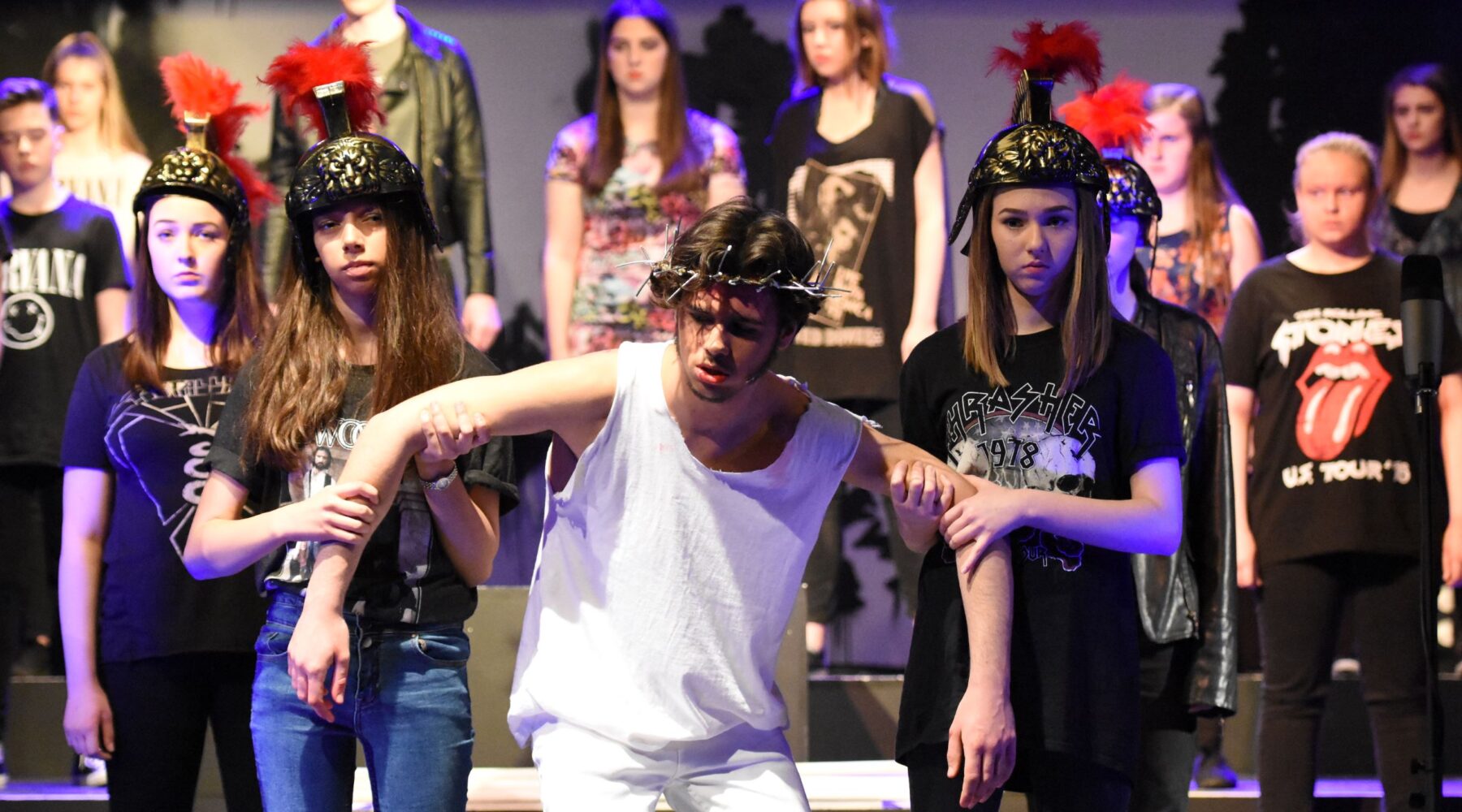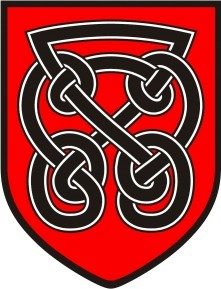
Curriculum
Key Stage 3
At Key Stage 3 students have an hour in the Drama Department every two weeks and they are introduced to the key formal elements in drama through group and individual work.
In Year 7 we look at formal elements and conventions including freeze frames, flashbacks, slow motion, mime, improvisation, and thought tracking amongst others. We then look at vocal skills -pitch, pace, pause, tone, scent, volume, emphasis and intonation. All these formal elements are explored through improvisation involving themes and different stimuli. We then move on to looking at how to perform excerpts of Shakespeare, including the study of Romeo and Juliet, Macbeth, The Merchant of Venice and The Tempest.
In Year 8 the emphasis is on semiotics of drama and theatre. The development of believable character leads on to experimentation with different styles of comedy. In the second term the key areas of character, context and plot are analysed and explored through improvisation and scripted work. We also look closely at structure, audience, space, improvisation (advanced), genre, style and convention and how they have developed these since Year 7. In term 3 we look at Soap Opera and how we can develop ideas within the conventions used.
In Year 9 we explore the practitioner Stanislavski and his ideas about Naturalism. This then leads on to discuss and explore Brecht’s Epic Theatre as a concept for performance. In term 2 we look at Physical Theatre and develop techniques whilst studying and performing Teechers by John Godber. The rest of the Key Stage 3 course focuses on looking at skills for GCSE and how all the areas explored in the drama course feed into the expectations of the subject at examination level. Students develop drama through a number of approaches in this final term.
Key Stage 4
BTEC Tech Award in Performing Arts
Component 1: Exploring the Performing Arts
During Component 1, students will:
- explore performance styles, creative intentions and purpose;
- investigate how practitioners create and influence what’s performed; and
- discover performance roles, skills, techniques and processes.
Aim: get a taste of what it’s like to be a professional actor, dancer or musical theatre performer.
Assessment: internally assessed assignments
Weighting: 30% of total course
Component 2: Developing Skills and Techniques in the Performing Arts
During Component 2, students will:
- take part in workshops, classes and rehearsals;
- gain physical, interpretative, vocal and rehearsal skills;
- apply these skills in performance; and
- reflect on their progress, their performance and how they could improve.
Aim: develop skills and techniques in the chosen discipline(s) of acting, dance and musical theatre.
Assessment: internally assessed assignments
Weighting: 30% of total course
Component 3: Performing to a Brief
To achieve this aim, students will:
- use the brief and previous learnings to come up with ideas;
- build on their skills in classes, workshops and rehearsals;
- review the process using an ideas and skills log;
- perform a piece to their chosen audience; and
- reflect on their performance in an evaluation report.
Aim: consider how practitioners adapt their skills for different contexts, and put this into practice in a performance.
Assessment: externally assessed task, where students work in groups of between 3 and 7 members to create a performance based on a set brief.
Weighting: 40% of total course
Key Stage 5
We study the BTEC Extended Certificate in Performing Arts which focuses on acting. This is the equivalent of an A Level but it involves considerably more performance content. Students work in a vocational context and perform devised and scripted plays. The approach is varied with both traditional and experimental content.
Enrichment
We have regular visits to performances and lunchtime and after school clubs. We run whole school productions which are open to all and the examination students perform regularly to an audience with a varied repertoire. Recent trips have been to see Othello, Blood Brothers, The Curious Incident of The Dog in the Night time and many other local or more obscure productions at various venues in the Three Counties. We produce a musical every 2 years which involves a variety of students with different levels of experience and a Staff and Sixth Form satirical pantomime in December.
Careers
Students can apply for university courses in the performing arts and many move on to study anything from Acting to Production Design. Drama is also valued for its transferable skills, including the ability to work in a team and solve abstract problems, which are hugely valuable to anyone involved in managing and communicating with people.
Staff
- Mr Trevor Evans – Head of Drama Department and Head of Art & Design Department
- Mrs Claudia Omar – Teacher of Drama; Assistant Headteacher (Student Wellbeing & Mental Health)
- Mr Ben Ruewell – Teacher of Drama and Teacher of History
Links
http://www.nationaltheatre.org.uk/
http://www.londontheatre.co.uk/
http://www.cambridgeartstheatre.com/
http://www.ambassadortickets.com/Milton-Keynes
http://www.queenmothertheatre.org.uk/
https://youtube.com/watch?v=YxvchTm3RFk&safe=active
https://www.youtube.com/watch?v=Be35MnjotjA – Please watch from 1.28 as you will be copying this section up until “we’re drawing a line”.
